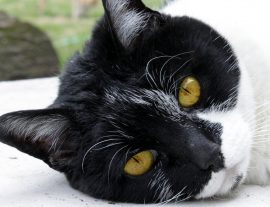Health problems can strike any cat at any age however it is particularly important to be vigilant with cats that are eight years or older, as senior cats are prone to particular health issues, including:
Overactive thyroid glands
Located in the neck, the thyroid controls many things including heart rate, mental alertness and calorie consume rates. Many senior cats experience an overactive thyroid with signs including weight loss, anxiety, whirring heart rate, excessive drinking and urination, signs of dehydration such as sunken eyes and baggy skin, and tatty fur.
Chronic kidney issues
A cat’s delicate kidney cells can be damaged by toxins in the environment such as garden lillies and medications. When kidney cells die they are never replaced and once a critical number are lost, the kidneys cannot do their job. Warning signs include excessive drinking and urination, weight loss, loss of appetite, signs of dehydration, and in later stages vomiting and mouth ulcers.
Arthritis
Legend has it that cats are lazy, but if you find your cat is slower than usual – especially in these cold weather months - they may be experiencing age-related joint decline. If your cat is having trouble jumping up to their favourite spot, seems cranky when picked up, or isn’t exploring as much as they used to, they may be feeling sore and stiff.
Dental disease
If puss’s breath is a bit whiffy, or they seem to be having trouble chewing food, it’s probably time for a dental check. Dental disease is both preventable and treatable with good home-care, nutrition and hospital treatments such as cleaning and surgical extractions.
Feline dementia
A common sign that a cat’s brain might be changing is when they appear to be lost in familiar environments. This confusion is often accompanied by howling as they become frightened and call for help. Behavioural management can be helpful for these patients, as can medications.
All of these common senior cat conditions are manageable with a little help from your vet. Special diets, medications, surgery and supplements can all play a role in helping your favour feline get the most out of their twilight years.
Article by: Brigitte Duffield, 5th Year Veterinary Student, Uni Vets Camden


